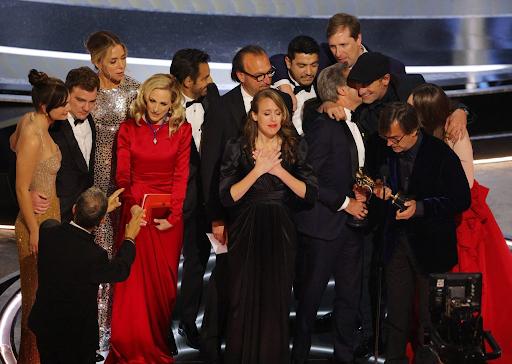Source: PBS
If nothing else, the 94th Academy Awards had its fair share of surprises that many did not see coming, though not necessarily the most desirable of surprises. For example, the show’s attempt to create an audience favorite award (one decided by the general public – i.e. Twitter users) was undermined by an onslaught of Zach Snyder fans, who ended up voting for the director’s films “Army of the Dead” and “Justice League” (in the case of the latter, specifically a moment involving superhero character the Flash) in large enough numbers to outrank such favorites as “Spider-Man: No Way Home”, a film for which many believe the Academy designed its Fan Favorite awards specifically for in order to make up for not nominating it for Best Picture. Perhaps even more frustrating was the decision to cut eight award presentations from the live telecast and show them in condensed forms during commercial breaks. Sources claim this was an effort to reduce the overall show time to under three hours, an effort that ultimately backfired as the show ended up running much longer than previous ceremonies. Of course, most of these situations pale in comparison to an unexpected confrontation between Will Smith and Chris Rock, in which the former responded quite violently to a joke the latter made at the expense of Smith’s wife Jada Pinkett Smith and her alopecia (a condition that causes major hair loss). All in all, if this year’s Academy Awards are to be remembered, it most likely won’t be for the most desired reasons.
Having said all of that, if one were to look past how the Oscars were presented and instead focus on the awards themselves and who and what won them, there is actually quite a bit to appreciate. Even though the events surrounding them might not have been the most pleasant, many of the biggest winners of the evening ended up breaking quite a bit of ground for the show’s nearly century-long history, all of it culminating in a Best Picture winner that many did not expect, but are nonetheless very happy to see.
In terms of the number of awards won overall, the film that ended up being the most triumphant was Warner Brothers and Legendary Entertainment’s science fiction epic “Dune”. Based on the novel by Frank Herbert, this Denis Villeneuve-directed feature ended up taking home six Academy Awards (many of them in technical categories): Best Original Score, Best Sound, Best Production Design, Best Cinematography, Best Film Editing, and Best Visual Effects. Villeneuve’s science fiction films are no strangers to the Oscars, as his previous works “Arrival” and “Blade Runner 2019” also received their fair share of Oscar recognition, so considering all that has happened so far, it shouldn’t be too surprising to see his next film, a direct follow-up to “Dune”, end up repeating some of this success.
Although Japan and director Ryusuke Hamaguchi were not able to find the success that “Parasite” had found just two years prior and take home the prize for Best Picture for the film “Drive My Car”, their efforts were allowed to have some minor payoff, as the film did end up winning the award for Best International Feature. This marks the first time in over a decade since a Japanese film has come out on top, as the nation’s last win in this category was back in 2008 for the film “Departures”, for which director Yojiro Takita was honored. Best Animated Feature, meanwhile, went to the Disney-produced musical “Encanto”, giving one of its directors Byron Howard his second win in the category (having previously won for 2016’s “Zootopia”), and for the first time, musician/filmmaker Ahmir “Questlove” Thompson was among those accepting the Best Documentary Feature award for his film “Summer of Soul (… Or, When the Revolution Could Not Be Televised)”.
The categories for Best Original Screenplay and Best Director, meanwhile, ended up serving as major firsts for their respective winners. For his film “Belfast”, Kenneth Branagh received his first Oscar in the Best Original Screenplay category, having been previously nominated for writing and directing such works as the adaptations of Shakespeare’s “Henry V” and “Hamlet”. As for Best Director, the award went to “The Power of the Dog” director Jane Campion, her first win in the category over the course of her decades-long career. Campion is the third female director to be named Best Director at the Oscars (as well as the third oldest of all Best Directors), and between her and previous winner Chloe Zhao for “Nomadland”, this is the first time two female directors have won the award back to back.
The acting awards offered little surprise in regards to who ended up winning them, although many found much to appreciate nonetheless. Jessica Chastain was named Best Actress for her work in “The Eyes of Tammy Faye”, and Ariana DeBose won Best Supporting Actress for playing the role of Anita in Steven Spielberg’s “West Side Story”. In the case of the latter, there are many milestones to be found in DeBose’s win: it’s the first time a queer person of color has won an Oscar, and between DeBose and Rita Moreno’s win in 1962, the film’s character of Anita (played by both Moreno and DeBose) joins Vito Corleone and the Joker as one of the few times in which separate actors have won Oscars for playing the exact same character. Then there is Will Smith, who won Best Actor for his work in “King Richard”; it will sadly not be the thing Smith will be remembered most for that evening, but the award does finally give Smith a long overdue Oscar after decades of being one of the entertainment industry’s most famous members.
In the end though, it was Sian Heder’s “CODA” that proved to be the ultimate victor. Not only did the film win in the categories of Best Adapted Screenplay and Best Supporting Actor (making recipient Troy Kotsur one of the few disabled Oscar winners), but it wound up being named the Best Picture of 2021 in spite of stiff competition from nine other nominees. “CODA” is the first Best Picture winner to feature a predominantly deaf cast, the first to have previously premiered at the Sundance Film Festival, and the first film distributed by a streaming platform (specifically AppleTV+) to be named Best Picture. How much of “CODA”’s win is an indicator of what’s to come from future Oscar winners is uncertain, but in any case, this is a groundbreaking win and a satisfying conclusion to what many people are viewing as the most unconventional (for better or worse) Academy Awards ceremony in recent memory.




